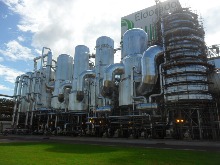
The evaporation plant, with a capacity of 1,600 tonnes/hour evaporated water, is the largest single line evaporation plant in the world with the purpose of concentrating black liquor up to 80% dry solids content for efficient and low-emission combustion in the recovery boiler.
The recovery boiler is also among the largest in the world in operation and has a 6,800 tonnes of dry solids/day black liquor burning capacity and steam generation of 1,109 tonnes of steam/hour. The steam will be used in the pulp manufacturing process and in power generation to supply the entire mill and produce a significant amount of power surplus. Additionally, the recovery boiler has high chemical recovery efficiency making the mill economically and environmentally sustainable.
Celso Tacla, Area President, South America, Metso’s Pulp, Paper and Power segment, explains that “the Eldorado project is a success since it overcomes major challenges, such as the large-size equipment that came from different parts of the world, requiring extremely well executed logistics.”
Eldorado Celulose e Papel is a Brazilian company operating the world’s largest single-line pulp mill with a capacity to produce 1.5 million tonnes a year of bleached eucalyptus pulp. The company, controlled by J&F Holding, has plans to build three parallel pulp lines by year 2020. These lines would produce a total of 5 million tonnes per year.
